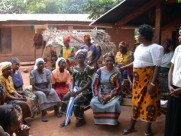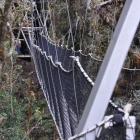One Sky to Open Leadership Program In Nigeria
In the well-known 2007 movie Blood Diamond, after numerous life-like violent scenes depicting Sierra Leone’s armed conflict provoked by the illegal diamond trade, the lead actor turns to his African counterpart and says, “At least we don’t have oil.†That one line, in many regards, is the central point of the entire issue—namely, conflict over natural resources from which wealth can be made more often than not results in violence and corruption.
Nigeria directly faces this issue today—it has both copious reserves of oil as well as violence and corruption. In the Niger Delta, environmental conflict over oil is persistent. Perhaps more insidiously, across the country, on-going corruption at every level of the private sector, including also the public sector, leaves the country bereft of state services like electricity, roads, schools, and more. As the six richest oil producing country in the world, this country should rank much higher than 158th out of 177 countries on the Human Development Index. This intentional creaming of money off the top leaves tens of millions of others without basic needs, not to mention a heavily degraded environment upon which economic livelihoods depend. The Niger Delta is the 5th most polluted ecosystem on the planet. How does Integral Theory serve these types of complex, intense, and heart-breaking global issues?
This is the inquiry for many integral practitioners working in international development. This week, the Canadian NGO One Sky—Canadian Institute for Sustainable Living was awarded a $500,000 grant from the Canadian International Development Agency for a project entitled Integral Applications to Sustainability in the Niger Delta. The Executive Director, Michael Simpson, and lead consultant on the project, Gail Hochachka, are both members of Integral Without Borders, a network of integral practitioners working in international development that grew out of Integral Institute’s Integral International Development Center.
“This grant is a testament to the exceptional work that One Sky has performed and to the value of an integral approach when facing significant systemic complexity,†said Robb Smith, CEO of Integral Institute. “We are thrilled that the Institute’s IIDC and IWB could play a role in helping to coalesce the talent and vision evident in this and other integral international development efforts. With the help of Gail Hochachka and others we plan to devote more resources to the development of integral development solutions as we move forward and look forward to the results of this program as they are published through the Institute’s Integral Research Center.â€
Four other members of Integral Without Borders were part of this project visioning team (Lee White, Adam Jones, Sandra Thomson, and Greg Brown), as well as Nigeria partner Patricia Eyamba and others on the One Sky team, illustrating the potential of such a global integral network.
From a previous four-year project with five Nigerian NGOs in sustainability and poverty alleviation, One Sky began to see that Right-hand quadrant interventions (such as organizational development, financial management, improved communications, and policy influence), while critically important, could not be held in place without more Left-hand quadrant interventions (such as personal leadership, self-awareness, moral intelligence, and interpersonal skills). Or, put simply: the complex array of sustainable development issues in Nigeria, requires leaders with the mindset, values, and competencies that can fully understand and respond to that complexity.
With this recent grant, One Sky is designing and delivering an integral leadership program that creates the emergent conditions for leaders to meet the complexity at hand. This project will develop the capacity of 30 young Nigerians currently working in toward environmental and economic sustainability in the Cross River region of the Niger Delta. These 30 practitioners come from ten organizations, doubling One Sky’s initial five NGO partners in their first project in Nigeria.
The project essentially involves engaging a personal development process (I), held in place with learning communities and a new social discourse (We), and enacted in breakthrough initiatives in their home organizations (It/Its). The project design recognizes and connects to what Wilber refers to as “Eros tiltâ€â€”the unfolding evolution of consciousness, culture, behaviors and systems. This unfolding dynamic will be engaged in various ways. In a systems sense (LR), the project will galvanize a holarchy of an established and strong civil sector network meshed with the multiple scales of government and socially engaged private sector interests. In a social sense (LL), the project design supports learning communities formed by the three participants from the ten organizations that engage in regular, formalized dialogue, both within their own organization and as a cohort, providing the container for a new level of thinking and social discourse. And, in a personal development sense (UL), the project engages the nuance of personal growth and the development of various capacities associated with transformative and translative leadership at the altitudes most appropriate to the individuals and their contexts.
Each participant will engage four times annually in intensive leadership development “retreats†to develop both the interior resolve and will, the personal skills, the cultural awareness and contacts, and the organizational and logistical capacity to be an effective leader. While a person cannot be “trained†to be a leader, they can be given emergent ground and enabling circumstances for leadership to emerge. They can be supported socially, morally and logistically while this leadership strengthens and these results can be effectively measured using both qualitative and quantitative measurements.
Which raises another key attribute of this project—how it will be assessed and evaluated over the three years. This project includes a pre/post assessment informed by Integral Research and funded in part by Integral Institute, so that at the end of three years, we will be able to really know if and to what extent change occurred in all quadrants. This Integral monitoring and evaluation approach is currently being designed and field-tested in Peru and will be brought into the Nigeria project later this year.
In a time where a complex world requires an equally complex response, it is enlivening to witness a larger donor agency like CIDA respond to this field-tested and innovative project proposal. From a foundation of experience, a decade of international work and four years in Nigeria, One Sky proposed the need for a more Integral approach to sustainability and poverty alleviation. When a donor responds to innovation—in this case, integral innovation born directly from field experience—they can surely enact care and compassion for all.
With much gratitude and excitement, we invite you to stay tuned for details on how this project unfolds!


